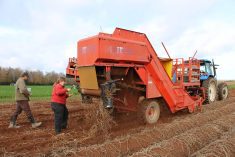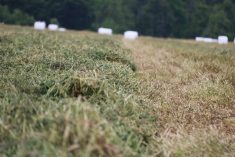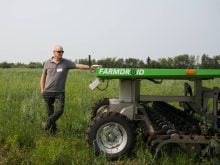New field-scouting tools, including drones, will be part of this year’s Crop Diagnostic School at the University of Manitoba’s Ian N. Morrison Research Farm at Carman.
The annual event that provides agronomists and farmers with hands-on, in-field learning, runs July 4 to 11 and July 14 to 17.
During the mornings, Crop Diagnostic School participants will learn about weeds and herbicide resistance, insects, cereal and soybeans diseases, nitrogen management in wheat and canola and vertical tillage, said John Heard, a soil fertility specialist with Manitoba Agriculture, Food and Rural Development and school spokesman.
Read Also

Tie vote derails canola tariff compensation resolution at MCGA
Manitoba Canola Growers Association members were split on whether to push Ottawa for compensation for losses due to Chinese tariffs.
There’s increasing interest in unmanned aerial vehicles (UAVs) or drones for crop scouting. A fixed wing and ’copter drone will be demonstrated.
- More from the Manitoba Co-operator: It’s a bird, a plane – no, it’s the farmer’s new eye in the sky
The school has partnered with Enns Brothers Equipment to demonstrate precision management techniques, Heard said.
“We’re going to be looking at some gadgets too,” he said. “Not everyone has a trained eye or calibrated eye for crop nutrition.”
The GreenSeeker, a tool for assessing nitrogen fertility based on crop colour, is now available as a hand-held unit for $500, Heard said. It can also predict yield.
An iPhone app that helps assess crop fertility, providing guidance on whether to add more nitrogen will be demonstrated.
It costs $175 for a day at the Crop Diagnostic School. (The group rate for 50 or more is $125 each.)
Credits are available to Certified Crop Adviser and Certified Crop Science Consultant.
The Organic Diagnostic Clinic July 18 costs $35. It will be an advanced course for commercial organic producers and advisers focused on field crops. Many of the weed and nutrient management concepts and strategies could have application for vegetable production, but the focus is on cereals, oilseeds and pulses.
Some information, such as cultural weed control, will be valuable to non-organic farmers, Heard said. It’s a tool to delay the onset of herbicide-resistant weeds.
“Management plays such an important role in organic,” he said.
“There are gleanings people can take from that they might work into their system at some point.”
To register for the Organic Diagnostic Clinic and/or the Crop Diagnostic School call 204-745-5663.















